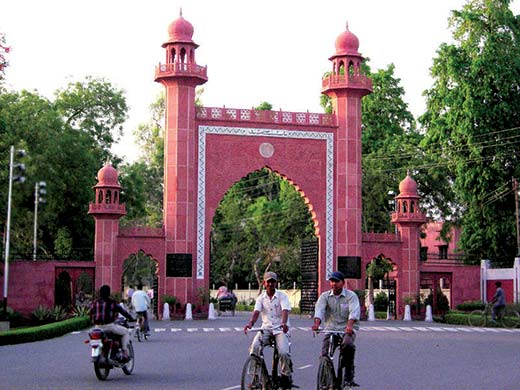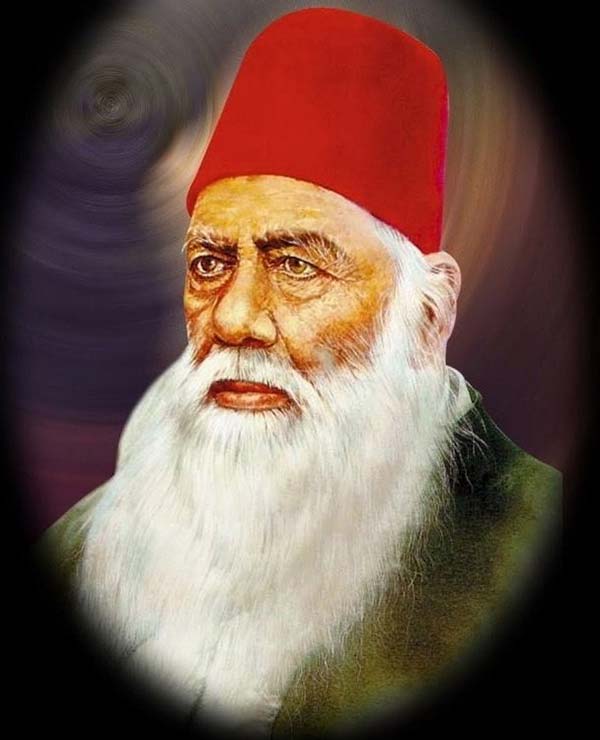by Syed Suhail Yaqoob
Sir Syed Ahmed Khan’s advice would have been to educate children, to concentrate on science and give away superstitions.

On October 17, 2020, Aligarh Muslim University (AMU) celebrated its centenary. Exactly 100 years ago, the Muslim University Act was passed which converted Anglo-Oriental College into the University. The establishment of the University was itself a great feat. Around 70 years, before then, Muslims in India had lost everything to British imperial power. The war of 1857 proved fatal to Indian Muslims as it provided an opportunity to the British to remove the symbolic Moghul power. Bahadur Shah Zafer was deported to Burma and his sons were killed in the most brutal way to send a message.
However, Muslims walked a long way since 1857 and were now deeply into Indian politics. Muslims created an organisation known as Muslim League in 1905; there was separate electorate in 1909; Lucknow-pact of 1916 was signed and Khilafat Movement was around the corner. In this situation, the establishment of a University must have created a lot of excitement and hope among Muslims. The University did not fail them. Further, it is imperative to speak of the man, Sir Syed Ahmed Khan, who represents the soul of the AMU.
Sir Syed Ahmed Khan
Throughout the nineteenth century, the East India Company and British India fully dislodged the Mughal Empire in India. Although Muslims tried to restore the power in 1857 they completely failed to do so. The British had already cultivated a section of people who came out to protect the British interests at that time. At the forefront were the Nawab’s and Maharaja’s who were at the forefront of protecting the British.
After the war of 1857, the British government went for the “Divide and Rule” policy that was specifically aimed at Muslims. The government pacified the Hindu’s and tried to portray Muslim danger to British rule in India (See the book by William Hunter). Moreover, the constant degeneration of social life among Muslims further weakened their position in political life. They were rejecting any education by labelling it as British. The education was designated as being ‘alien’. There were few takers of modern education. The education was confined to Madrassa’s and only Arabic, Persian, Urdu was studied. The scientific sense did not prevail among Muslims at that time. The Muslim aristocracy was in deep crisis, the social and political life had become corrupt due to dislodging of Moghul power in India. Furthermore, the Brahman’s of India also tried to reform their religion in order to capture economic, social and political power. The reformists’ movements like Brahmo Samaj led by Raja Ram Mohan Roy and Shuddi Movement by Dayanand Saraswati are a case in point.
It was in this era that Sir Syed Ahmed Khan landed on the scene. Sir Syed belonged to a highly aristocratic family which had a deep connection with the Mughal Darbar. A keen mind he must have been disturbed by the events of 1857. His keenness can be gauged from the fact that he wrote down the book on the old monuments of Delhi known as Asar-us-Sanadid. The research was wonderful in its details. He also wrote a commentary on Aine-Akbari which is still recognised as a reference book. Most people are not still aware that he also wrote down the book which was a critique of William Hunter’s book The Indian Musalman. The book falsified the claims that Muslims are the number one danger to the British in India. His most important contribution to literature was his biography of our beloved Prophet (PBUH). This biography was written to counter the work of Sir Munir’s work on the prophet (The life of Mohamet). For this work, Sir Syed travelled Europe extensively for the collection of references. The time period spent in Europe had a deep influence on his mental outlook. Upon returning from Europe, he vehemently and enthusiastically asked for educational institutions for the betterment of Muslims in India. His efforts finally bear fruit with the establishment of Anglo-Oriental College at Aligarh. He also published a journal, Tahzeebul Akhlaq. The journal demanded total revaluation in the social, economic and political life of Muslims in India.

The college’s establishment was not without difficulties. He was blamed for defaming Islam by bringing foreign culture especially his ideas about women. The seminary at Deoband was at the forefront of the opposition. Caught in the cycle of historical imagination, traditionalism and patriarchal setup, this seminary used everything in its power to oppose Sir Syed’s vision for Muslims in India. For instance, Sir Syed wanted modern education for Muslim women which the seminary at Deoband thought was against Islamic culture and was polluting Muslim women minds. However, not all Deobandi’s were against the vision of Sir Syed. One among them was Sayyid Mumtaz Ali who wrote Huquq un-Niswan for the emancipation of women in Muslim society. When Sir Syed read the manuscript he tore the book in order not to attract more opposition from the clergy.
Not only had the seminary differed on the status of Muslim women they had also issues regarding the curriculum to be taught in the Anglo-Oriental College. The seminary’s best-taught subjects were Arabic, and Persian, however, Sir Syed Ahmed Khan introduced many subjects like science, geography in the curriculum. Furthermore, the focus was on the translation of many important books into Urdu so as to make books available to students.
Sir Syed’s another important step was to cultivate a particular lifestyle among the students. The students were to have a Fez cap which imitated the Turkey’s social life, wears nice and clean clothes and had to attend residential canteens at a fixed time. The residential life was, in Sir Syed’s mind, quite important so as to keep students away from the degraded social life of Muslims in India.
In one particular incident, the students protested against Sir Syed for being too rigid in the residential college. For Sir Syed, the residential college provided a unique opportunity to create an Ashrafi class among Muslims in India. Sir Syed had himself come from an aristocratic family and the college was a means for him to cultivate an elite Muslim class. He believed that this class will be capable of leadership over time among Muslims in India. Anglo-Oriental College was specially created to create and reform this class (See the book The Aligarh’s First Generation). Many people criticise Sir Syed for class-politics however he knew that an upper class like Ashrafi’s, if cultivated and reformed, would lead Muslims out of degeneration in social and political life. Even today the remnants of that aristocratic lifestyle are still visible among students. The students still love to wear Sherwani that reflects nothing but upper-class social life. Many people do not know that Sir Syed hated lower class people. He wanted a reformed and progressive Ashrafi class.
Sir Syed and Congress
Sir Syed was a keen observer of events in political life. After the war of 1857, he completely tried to change British perceptions towards Muslims in India. The two major issues happened during the last phases of nineteenth-century and completely changed his outlook. The first was Urdu-Hindi controversy and the formation of Indian National Congress. Some Hindu’s vehemently opposed the Urdu being made an official language despite speaking it. And he began to see Indian National Congress as a Hindu Braham body. Nevertheless, more than 99 per cent of members belonged to upper-caste Hindu’s. Sir Syed also did not accept Indian National Congress being “truly National” as it represented only a section of Indian society. Sir Syed is not an exception. Many Dalit leaders simply did not accept INC.

Moreover, Sir Syed was clear that INC will use Muslims for their own interests and it will retard their progress and development. That is why he chided any Muslim who will oppose the British government in India. Further, he saw it clearly that given the demography of Indian sub-continent Muslims will be at disadvantage. In this situation, his main concern was to have as much support as possible from the British. It is no wonder many a faculty of the college were the British for instance Mr Beck was instrumental in shaping the mindset of Sir Syed Ahmed Khan. Sir Syed also began to describe Muslims as Quam.
Sir Syed and Jamaludin Afgani
Jamal-u-din Afghani is a known figure in the annals of Indian history. He is best known for his ideology which is considered as Pan-Islamic. He was also in opposition to Sir Syed particularly regarding his beliefs about Islam and the usage of Quam. Sir Syed’s main concern was Muslims of Indian rather than the whole Muslim world. Every time he was asked about the terminology used, he would refer to Muslims of India. His quam refers to Muslim of India rather than the whole world. He was disinterested in the politics of the Muslim world as a whole whereas Jamal-u-din Afghani’s thoughts concerned the whole Muslim world. Sir Syed considered it unfeasible but impracticable. He thought that bringing the whole Muslim world into the discourse will create problems for Muslims in India. This will lead to distraction and problems. He simply wanted to develop an education system which is more scientific and humane. And he was right in his approach. It is interesting to note how Sir Syed would have behaved when AMU plunged in the politics of the Khilafat movement. Not only is it also important to see what Sir Syed would have thought of Mohammad Iqbal who also supported a pan-Islamic movement.
Sir Syed’s Relevance

We have forgotten the legacy of Sir Syed Ahmed Khan. The best we do is to celebrate Sir Syed Day, go on a trip to some exotic place over a fine dinner. Being an Aligarian, I have seen things moving in the wrong direction. Instead of spending money on the educational infrastructure, we continue to waste money on food and other items. Further, the Muslims are still embedded in the past historical imagination where we praise past heroes. No doubt it is important to keep our historical heroes to create and manufacture identity; however, Indian Muslims are too much concerned about the past.
There is a particular anecdote about the meeting between Sir Syed and Mirza Ghalib. Sir Syed went to Ghalib for the foreword for his commentary on Ain-e-Akbari, however, Ghalib chided him for being too much concerned about the past rather than future. This meeting changed Sir Syed Ahmed Khan for good. Further suppression and oppression over the years made Muslims more superstitious; they must come out of superstition and believe their own faculties. Sir Syed Ahmed Khan’s advice would have been to educate children, to concentrate on science and give away superstitions.
(The author is pursuing PhD at Aligarh Muslim University in Economics with a focus on gender. The opinions expressed in this article are those of the author’s and do not purport to reflect the opinions or views of Kashmir Life.)















